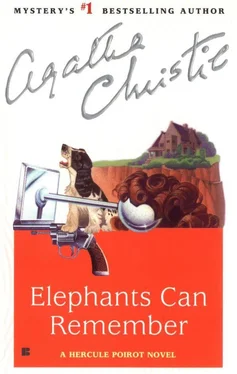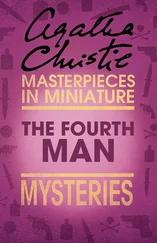Agatha Christie - Elephants Can Remember
Здесь есть возможность читать онлайн «Agatha Christie - Elephants Can Remember» весь текст электронной книги совершенно бесплатно (целиком полную версию без сокращений). В некоторых случаях можно слушать аудио, скачать через торрент в формате fb2 и присутствует краткое содержание. Год выпуска: 2004, ISBN: 2004, Издательство: Berkley, Жанр: Классический детектив, на английском языке. Описание произведения, (предисловие) а так же отзывы посетителей доступны на портале библиотеки ЛибКат.
- Название:Elephants Can Remember
- Автор:
- Издательство:Berkley
- Жанр:
- Год:2004
- ISBN:ISBN-13: 978-0425067826
- Рейтинг книги:3 / 5. Голосов: 1
-
Избранное:Добавить в избранное
- Отзывы:
-
Ваша оценка:
- 60
- 1
- 2
- 3
- 4
- 5
Elephants Can Remember: краткое содержание, описание и аннотация
Предлагаем к чтению аннотацию, описание, краткое содержание или предисловие (зависит от того, что написал сам автор книги «Elephants Can Remember»). Если вы не нашли необходимую информацию о книге — напишите в комментариях, мы постараемся отыскать её.
Elephants Can Remember — читать онлайн бесплатно полную книгу (весь текст) целиком
Ниже представлен текст книги, разбитый по страницам. Система сохранения места последней прочитанной страницы, позволяет с удобством читать онлайн бесплатно книгу «Elephants Can Remember», без необходимости каждый раз заново искать на чём Вы остановились. Поставьте закладку, и сможете в любой момент перейти на страницу, на которой закончили чтение.
Интервал:
Закладка:
"No," said Mrs. Oliver. "I rather wish I hadn't gone to that one."
"Didn't you enjoy it?"
"Yes, I did in a way because I hadn't been to one before. And so-well, the first time there's always something that amuses you. But," she added, "there's usually something that annoys you as well."
"And something happened to annoy you?"
"Yes. And it's connected in an odd sort of way with you, And I thought-well, I thought I ought to tell you about it because I didn't like what happened. I didn't like it at all."
"Sounds intriguing," said Celia, and sipped her sherry.
"There was a woman there who came and spoke to me. I didn't know her and she didn't know me."
"Still, I suppose that often happens to you," said Celia.
"Yes, invariably," said Mrs. Oliver. "It's one of the-hazards of literary life. People come up to you and say, 'I do love your books so much and I'm so pleased to be able to meet you.' That sort of thing."
"I was secretary to a writer once. I do know about that sort of thing and how difficult it is."
"Yes, well, there was some of that too, but that I was prepared for. And then this woman came up to me and she said, 'I believe you have a goddaughter called Celia Ravenscroft.' "
"Well, that was a bit odd," said Celia. "Just coming up to you and saying that. It seems to me she ought to have led into it more gradually. You know, talking about your books first and how much she'd enjoyed the last one, or something like that. And then sliding into me. What had she got against me?"
"As far as I know she hadn't got anything against you," said Mrs. Oliver.
"Was she a friend of mine?"
"I don't know," said Mrs. Oliver.
There was a silence. Celia sipped some more sherry and looked very searchingly at Mrs. Oliver.
"You know," she said, "you're rather intriguing me. I can't see quite what you're leading into."
"Well," said Mrs. Oliver, "I hope you won't be angry with me."
"Why should I be angry with you?"
"Well, because I'm going to tell you something, or repeat something, and you might say it's no business of mine or I ought to keep quiet about it and not mention it."
"You've aroused my curiosity," said Celia.
"Her name she mentioned to me. She was a Mrs. Burton-Cox."
"Oh!" Celia's "Oh" was rather distinctive, "Oh."
"You know her?"
"Yes, I know her," said Celia.
"Well, I thought you must, because-"
"Because of what?"
"Because of something she said."
"What-about me? That she knew me?"
"She said that she thought her son might be going to marry you." Celia's expression changed. Her eyebrows went up, came down again. She looked very hard at Mrs. Oliver.
"You want to know if that's so or not?"
"No," said Mrs. Oliver, "I don't particularly want to know.
I merely mention that because it's one of the first things she said to me. She said because you were my goddaughter, I might be able to ask you to give me some information. I presume that she meant that if the information was given to me I was to pass it on to her."
"What information?"
"Well, I don't suppose you'll like what I'm going to say now," said Mrs. Oliver. "I didn't like it myself. In fact, it gives me a very nasty feeling all down my spine because I think it was-well, such awful cheek. Awful bad manners.
Absolutely unpardonable. She said, 'Can you find out if her father murdered her mother or if her mother murdered her father?' "
"She said that to you? Asked you to do that?"
"Yes."
"And she didn't know you? I mean, apart from being an authoress and being at the party?"
"She didn't know me at all. She'd never met me, I'd never met her."
"Didn't you find that extraordinary?"
"I don't know that I'd find anything extraordinary that that woman said. She struck me," said Mrs. Oliver, "if I may say so, as a particularly odious woman."
"Oh, yes. She is a particularly odious woman."
"And are you going to marry her son?"
"Well, we've considered the question. I don't know. You knew what she was talking about?"
"Well, I know what I suppose anyone would know who was acquainted with your family."
"That my father and mother, after he had retired from India, bought a house in the country, that they went out one day for a walk together, a walk along the cliff path. That they were found there, both of them shot. There was a revolver lying there. It belonged to my father. He had had two revolvers in the house, it seems. There was nothing to say whether it was a suicide pact or whether my father killed my mother and then shot himself, or my mother shot my father and then killed herself. But perhaps you know all this already."
"I know it after a fashion," said Mrs. Oliver. "It happened I think about twelve-fifteen years ago."
"About that, yes."
"And you were about twelve or fourteen at the time."
"Yes…"
"I don't know much about it," said Mrs. Oliver. "I wasn't even in England myself. At the time-I was on a lecture tour in America. I simply read it in the paper. It was given a lot of space in the press because it was difficult to know the real facts-there did not seem to be any motive. Your father and mother had always been happy together and lived on good terms. I remember that being mentioned. I was interested because I had known your father and mother when we were all much younger, especially your mother. I was at school with her. After that our ways led apart. I married and went somewhere and she married and went out, as far as I remember, to India or some place like that, with her soldier husband.
But she did ask me to be godmother to one of her children.
You. Since your mother and father were living abroad, I saw very little of them for many years. I saw you occasionally."
"Yes. You used to take me out from school. I remember that. Gave me some specially good feeds, too. Lovely food you gave me."
"You were an unusual child. You liked caviar."
"I still do," said Celia, "though I don't get it offered to me very often."
"I was shocked to read this mention of things in the paper.
Very little was said. I gathered it was a kind of open verdict.
No particular motive. Nothing to show. No accounts of quarrel, there was no suggestion of there having been an attack from outside. I was shocked by it," said Mrs. Oliver, "and then I forgot it. I wondered once or twice what could have led to it, but as I was not in the country-I was doing a tour at the time, in America as I've said-the whole thing passed out of my mind. It was some years later when I next saw you and naturally I did not speak of it to you."
"No," said Celia, "I appreciate that."
"All through life," Mrs. Oliver said, "one comes across very curious things that happen to friends or to acquaintances.
With friends, of course, very often you have some idea of what led to-whatever the incident might be. But if it's a long time since you've heard them discussed or talked to them, you are quite in the dark and there is nobody that you can show too much curiosity to about the occasion."
"You were always very nice to me," said Celia. "You sent me nice presents, a particularly nice present when I was twenty-one, I remember."
"That's the time when girls need some extra cash in hand," said Mrs. Oliver, "because there are so many things they want to do and have just then."
"Yes, I always thought you were an understanding person and not-well, you know what some people are like. Always questioning, and asking things and wanting to know all about you. You never asked questions. You used to take me out to shows, or give me nice meals, and talk to me as though, well, as though everything was all right and you were just a distant relation of the family. I've appreciated that. I've known so many nosey-parkers in my life."
Читать дальшеИнтервал:
Закладка:
Похожие книги на «Elephants Can Remember»
Представляем Вашему вниманию похожие книги на «Elephants Can Remember» списком для выбора. Мы отобрали схожую по названию и смыслу литературу в надежде предоставить читателям больше вариантов отыскать новые, интересные, ещё непрочитанные произведения.
Обсуждение, отзывы о книге «Elephants Can Remember» и просто собственные мнения читателей. Оставьте ваши комментарии, напишите, что Вы думаете о произведении, его смысле или главных героях. Укажите что конкретно понравилось, а что нет, и почему Вы так считаете.












